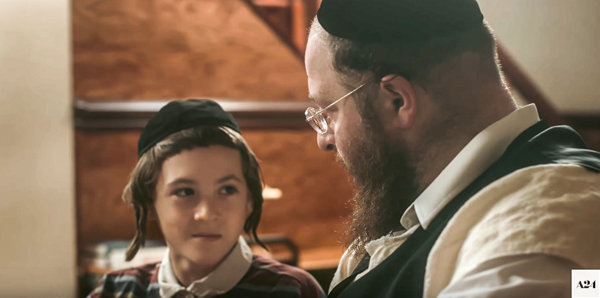Lenten Campaign 2025
This content is free of charge, as are all our articles.
Support us with a donation that is tax-deductible and enable us to continue to reach millions of readers.
For many on the outside looking in, the distinct garb, language, and customs of New York’s isolated Hasidic Jewish community is the outer shell of a bewildering mystery. But in Joshua Weinstein’s thoughtful feature debut, Menashe, we are drawn deep into the Hasidic community of Borough Park, Brooklyn, where the subtleties of daily life there are captured with a documentarian’s eye.
But Weinstein’s character study is more than a still, small ode to cultural particularity; it’s a strikingly universal story about human brokenness.
YouTube comedian Menashe Lustig stars as the title character, a hapless, Chaplin-esque widower who is struggling to piece together just about every aspect of his life. His job as grocery clerk is one long fiasco that reeks of fish; his debts are piling up and his rent for his small apartment is overdue; and his dates arranged by a matchmaker are uncomfortable at best. The overweight schlimazel (as he’s known around town) is perpetually late, sweaty, and explaining himself. He no longer wears the black hat and coat that other more respectable Hasidic men wear, an unmistakable sign to his peers that he can’t get it together.
Menashe’s greatest struggle, though, is his only son, the 10-year-old Rieven. To honor tradition, the rabbi has placed Rieven with Menashe’s religiously serious brother-in-law and his wife to be “raised in a proper home.” The arrangement has all the weight of legal custody with the added dimension of religious duty, so all the heartbroken Menashe can do is try and catch his son around town to spend time with him on the fly.
But being forced to live apart from his “only consolation” feels like one struggle too many, and Menashe risks even deeper conflict with his community by periodically bringing his son back to his apartment. Menashe would clearly like to be his son’s teacher, but is also content just to spend time as his friend, bonding with him over a small baby chick Menashe brought home for Yom Kippur. Like the citron in Ushpizin, the chick embodies both their fragile family situation and the abiding hope of their faith.
The story unfolds almost entirely in Yiddish – that is, until Menashe finds himself downing malt liquor with a few Hispanic coworkers of the grocery one night. When the men laugh about Menashe having the freedom of being single, Menashe grows quiet, and then makes a confession to them in English. His marriage with his wife was a rocky one, and a year later, he is still racked with guilt over the circumstances surrounding her death. Behind all of Menashe’s disintegration is this deep, self-inflicted wound of not having loved his wife well enough. “¿Qué dijo Jesucristo?” (“What does Jesus say?”) one of the men responds. “If you forgive, he’ll forgive you.”
It’s a turning point for Menashe, who humbles himself before his brother-in-law and insists on shouldering the responsibility of hosting his wife’s memorial. He wants to prove once and for all – to the community, to his son, and to himself – that he can be a mensch, a serious man. But Menashe doesn’t just want respect; he wants to atone and be made whole again. His ritual immersion in the mikveh bath reflects his desire to stand naked before his creator, warts and all, and be purified.
Menashe is a potent reminder, and a timely one at that, of the old verities that we all carry in our heart. As we walk beside Menashe through his own distinct web of relationships and duties and rituals, we find a drive toward love that’s dogged at every step by his own stupid frailty.
That’s another bewildering mystery, but one that every human being knows all too well.

